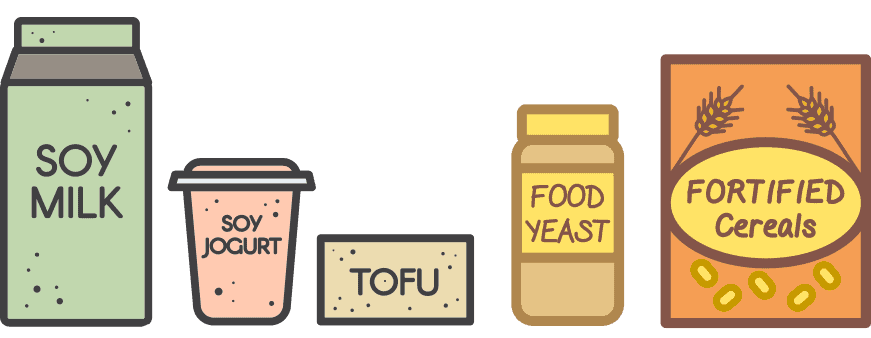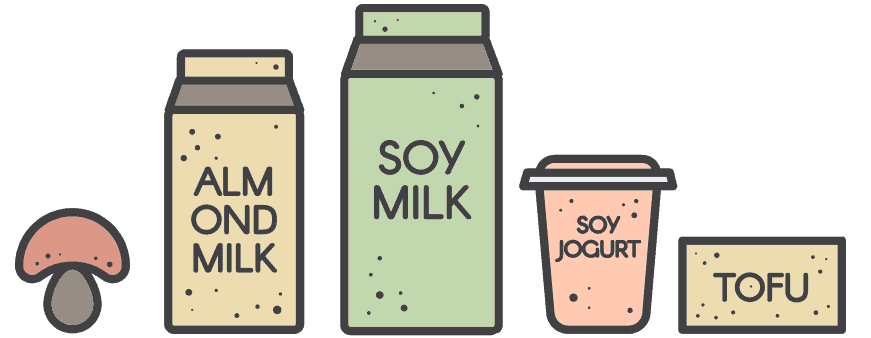Vegan diets are characterized by primarily being plant-based as animal products (e.g., meat, poultry, fish, eggs, honey, etc.) are prohibited. Although plant-derived food products are often considered extremely healthy, there are some nutrients that the general population usually obtains from animal products. Thus, there are certain nutrients that vegans have to be more mindful of to consume to avoid adverse health effects.
Vitamins are essential micronutrients that are necessary for proper bodily function. Although they are required in minuscule quantities, vitamin deficiencies can be common for people with specific diets. Vegans have access to most vitamins from plant-based food products, but there are a few vitamins that have been observed to be generally lacking in vegan diets. These include vitamin B2, vitamin B12, and vitamin D.
Table of Contents
What are Vitamins?
Vitamins are highly complex, organic compounds that are essential for normal metabolism. Unlike macronutrients such as carbohydrates, proteins, and fats that are required in large quantities, vitamins are micronutrients that are only required in trace amounts. However, the absence of these nutrients can cause various disorders since they are necessary for important bodily functions such as growth, development, health, and reproduction (1).
Vitamins are primarily divided into two groups: water-soluble and fat-soluble vitamins.
Defined according to their polarity and solubility, water-soluble vitamins are those that are able to fully dissociate in water. These include vitamin C (ascorbic acid) and the vitamin B complex (B1 [thiamine], B2 [riboflavin], B3 [niacin], B5 [pantothenic acid], B6 [pyridoxine, pyridoxal, and pyridoxamine], B7 [biotin], B9 [folic acid], B12 [cobalamin]) (2).
On the other hand, fat-soluble vitamins are those that can only fully dissociate in organic solvents such as oils and are absorbed and transported in a manner similar to that of fats. These include vitamin A, vitamin D, vitamin E, and vitamin K (3).
Most vitamins are essential which means that the human body cannot synthesize them on its own. Among all the different types of vitamins the human body needs, it can only really synthesize two: vitamin B3 and vitamin D.
Vitamin B3, or niacin, can be synthesized in the liver using the amino acid tryptophan as the precursor.
While the human body can indeed synthesize vitamin D, it requires the sun for the process. With UV exposure, the human skin can convert a steroid cholesterol into a form of vitamin D called cholecalciferol. This form of vitamin D is then converted to calcidiol in the liver, and then finally converted to calcitriol (the active form of the vitamin) in the kidneys.
Meanwhile, the body cannot synthesize the rest of the vitamins A, B, C, E, and K.
Most people acquire their vitamin requirements through their diets. Especially for people with omnivorous diets, the vitamin requirements are usually achieved since they are really only needed in tiny amounts. Other people achieve their vitamin requirements through multivitamin supplements.
Since vitamins are naturally found in different food items, people with specific diets such as vegans are more prone to certain vitamin deficiencies because of the food products that they are not consuming. Although plant-based food products such as fruits and vegetables are considered to be extremely healthy and vitamin-rich, there are some vitamins that most people typically acquire from food that vegans do not consume such as meat, poultry, fish, and dairy.
Vitamins that Most Vegans Lack
Here are a few vitamins that vegans have to be more mindful of to avoid deficiencies and the subsequent adverse health effects.
Vitamin B12

Vitamin B12, also known as cobalamin, is one of the eight B vitamins. It is a water-soluble vitamin that is intrinsically involved in the metabolism of all the cells in the body. Vitamin B12 serves as a cofactor in DNA synthesis and is involved in fatty acid and amino acid metabolism as well. Additionally, vitamin B12 is necessary for the development and initial myelination of the central nervous system – as well as for the maintenance of its normal function (4).
Although different organisms are able to produce different vitamins, vitamin B12 is found to be only produced by bacteria. These bacteria can be found on plants, but then proliferate and become gut bacteria when animals graze on these plants. In the gut of animals, the bacteria then produce vitamin B12 which is absorbed internally.
Since most omnivorous populations acquire their vitamin B12 from animal sources such as meat, poultry, fish, and eggs, it is understandable why vegans and vegetarians are prone to vitamin B12 deficiency.
Due to the involvement of this vitamin in the nervous system, a vitamin B12 deficiency can cause severe damage (5). Even when vitamin B12 levels are slightly lower than the normal range, a range of symptoms (e.g., fatigue, lethargy, staggering balance problems, depression, poor memory, breathlessness, headaches, etc.) can present themselves.
Aside from neurological symptoms, the vitamin deficiency can also cause megaloblastic anemia. Since vitamin B12 serves as a cofactor in DNA synthesis, a vitamin B12 deficiency subsequently leads to megaloblastic anemia as red blood cell production is impaired. Additionally, people suffering from this vitamin deficiency can also expect gastrointestinal distress symptoms including an alteration in bowel motility (i.e., either constipation or diarrhea) and a loss of bowel or bladder control.
Fortunately, vegans can sufficiently fuel themselves with vitamin B12 from the wide array of vitamin B12-fortified food products such as plant milk, soy products, breakfast cereals, and nutritional yeast. Vitamin B12 supplements are also available and can be taken daily or weekly to intake the required amounts (i.e., 2.4 micrograms per day for adults, 2.6 micrograms per day during pregnancy, 2.8 micrograms per day while breastfeeding).
Vitamin B2

Vitamin B2, also known as riboflavin, is another one of the eight B vitamins. Just like vitamin B12, this water-soluble vitamin is also heavily involved in numerous cellular processes that maintain the body’s health and homeostasis (6).
Particularly, vitamin B2 is an essential component for two highly important coenzymes: flavin mononucleotide (FMN) and flavin adenine dinucleotide (FAD). These coenzymes are then necessary for a wide array of flavoprotein enzyme reactions involved in processes such as energy production, cellular function, growth, and development, and metabolism of fats, drugs, and steroids.
As vitamin B2 is a component in FMN and FAD, the vitamin can be sourced from these enzymes as well in food products. While both plant and animal sources have these enzymes, the concentrations are typically higher in food products such as organ meats, poultry, fish, and eggs. The vitamin can also be found in milk and dairy products, especially since the vitamin was first isolated from whey back in the late 1870s.
While most dietary vitamin B2 is restricted in food products that are typically animal-derived, vegans have less access to natural sources of vitamin B2. A deficiency in vitamin B2 can lead to a number of symptoms such as sore throat, hyperemia (excess blood buildup), edema of oral and mucous membranes, cheilosis (the inflammation of the corners of the mouth), and glossitis (the inflammation of the tongue), which further leads to loss of hair, inflammation of the skin, cataract development, migraine prophylaxis, and decrease in hemoglobin status (7).
While people with omnivorous diets obtain their daily recommended intake of vitamin B2 from animal sources, vegans can also get their vitamin B2 requirements through the same route as vitamin B12 – from vitamin-fortified food. For example, vitamin B2 deficiency is relatively uncommon in the US due to vitamin enrichment regulations. Thus, vegans in the US can get sufficient vitamin B2 from products made with flour, cornmeal, and rice as these are fortified with a wide selection of vitamins.
Vegans can also obtain vitamin B2 supplementation to achieve the recommended intake (i.e., 1.3 milligrams per day for adults, 1.4 milligrams per day during pregnancy, 1.6 milligrams per day while breastfeeding).
Vitamin D

Vitamins can exist in a variety of related forms called vitamers. A fat-soluble vitamin, vitamin D exists in several of these vitamers. However, the two main vitamers include vitamin D2 (ergocalciferol) and vitamin D3 (cholecalciferol). Other vitamin D vitamers are then collectively referred to as calciferol.
Vitamin D is unique among the other vitamins in that it can be synthesized in the human body through photobiology. This works when the UV rays (specifically UV B) are absorbed by a steroid cholesterol known as 7-dehydrocholesterol (7-DHC) in the skin. As 7-DHC absorbs the UV radiation, it undergoes a structural rearrangement in its double bonds that result into its new conformation, vitamin D3 or cholecalciferol (8).
There are a number of functions that have been attributed to vitamin D, but the main functions of the vitamin have been to control calcium absorption in the small intestine and work together with the parathyroid hormone to mediate skeletal mineralization and maintain calcium homeostasis in the bloodstream (9).
Although vitamin D can be synthesized in the body through sun exposure, people also acquire vitamin D through dietary sources. Just like with vitamin B12 and B2, vitamin D poses a problem for vegans since natural sources of vitamin D are animal products such as oily fish, red meat, liver, and egg yolks (10).
Since vitamin D is heavily involved with calcium uptake, homeostasis, and skeletal mineralization, it follows that a vitamin D deficiency leads to poor bone health. A widely known effect of vitamin D deficiency is rickets – a childhood disease characterized by impeded growth and deformed long bones.
A vitamin D deficiency later in life can also lead to other bone diseases such as osteomalacia (the softening of bones) and osteoporosis (low bone mass). These diseases cause bones to weaken which affects the quality of life and makes people with these diseases prone to fractures.
If sunlight exposure is minimal, then vegans have to acquire vitamin D dietarily through fortified food such as breakfast cereals and fat spreads. Supplements are also available for people to receive their daily recommended intake of vitamin D (15 micrograms per day for adults up to the age of 70, 20 micrograms per day for adults above the age of 70).
References
1. https://www.researchgate.net/
2. https://www.ncbi.nlm.nih.gov/
3. https://www.ncbi.nlm.nih.gov/
5. https://www.ncbi.nlm.nih.gov/




